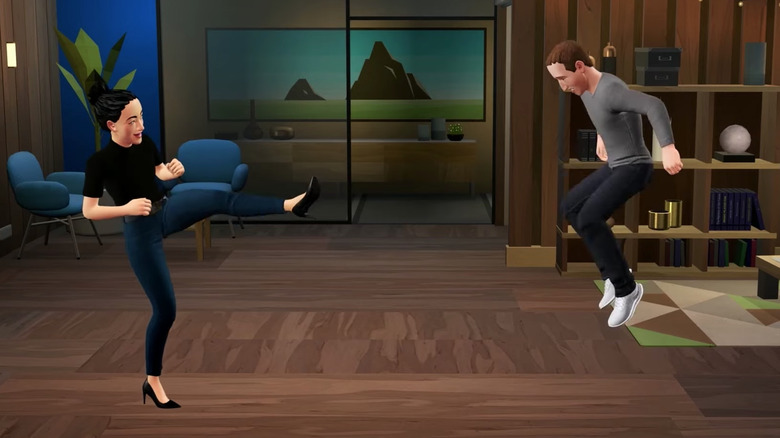Meta's VR Avatar Legs Aren't All They Appear To Be
One of the biggest surprises that came out of Meta's Connect event earlier this month was the introduction of metaverse avatars with legs. It was a reason to celebrate, especially after the fun poked at Meta for the leg-less floating torso that users have for virtual avatars in the Horizon Worlds. Except, those legs weren't totally the real deal.
Meta used motion tracking tech to generate the legs that we saw during the event. The company didn't specify that caveat, which led many to believe that it has finally cracked the code for generating full-body avatars using the sensors onboard an advanced VR headset like the Quest Pro. In a statement shared with UploadVR, Meta clarified that "the segment featured animations created from motion capture."
For those who've been wondering about the legs shown in the Connect keynote (@hrafntho). Meta: "To enable this preview of what’s to come, the segment featured animations created from motion capture."
— Ian Hamilton (@hmltn) October 13, 2022
However, the company's statement suggests that it used VR capture for the preview, which only served as demonstration of "what's to come." While Meta revealed some very realistic advanced motion capture tech at its annual event, the company didn't set an official date for avatars with legs for VR headset users and if it will be limited to a certain category of high-end headsets logging into the Horizon Worlds.
More problems that just legs
Zuckerberg's demo of leggy avatars immediately stirred skepticism online, with long-time VR enthusiasts questioning the legitimacy of the presentation. Now that Meta has cleared the air, the question remains — why would Meta showcase something that is clearly not ready for prime time? One can argue that Meta wanted to show something exciting to drum up hype and bring in new users to its metaverse world, but on the flip side, it just might drive away the enthusiasm.
Legs are coming soon! Are you excited? 🎉 pic.twitter.com/SB6qSepKm4
— Meta Horizon (@MetaHorizon) October 11, 2022
However, rendering legs in a virtual world isn't easy. It is no surprise that even a company like Meta, with all the money and talent in the world, hasn't been able to figure it out despite burning billions of dollars on its metaverse ambitions. Even Zuckerberg remarked during the event, "Seriously, legs are hard." But legs aren't the only problem for Meta as it pitches a metaverse future of remote collaboration and recreation.
Reports suggest that even Meta employees are wary of the bugs and stability issues. The company has reportedly told employees to meet more frequently in a virtual world to drive interest and adoption. Investor trust in the company is also weakening after it went all-in on metaverse dreams, while the likes of TikTok continue to eat into its social media lunch. On top of it, there are the privacy concerns engulfing the company and its terrible track record with controlling the spread of misinformation and hate speech on its platforms.

